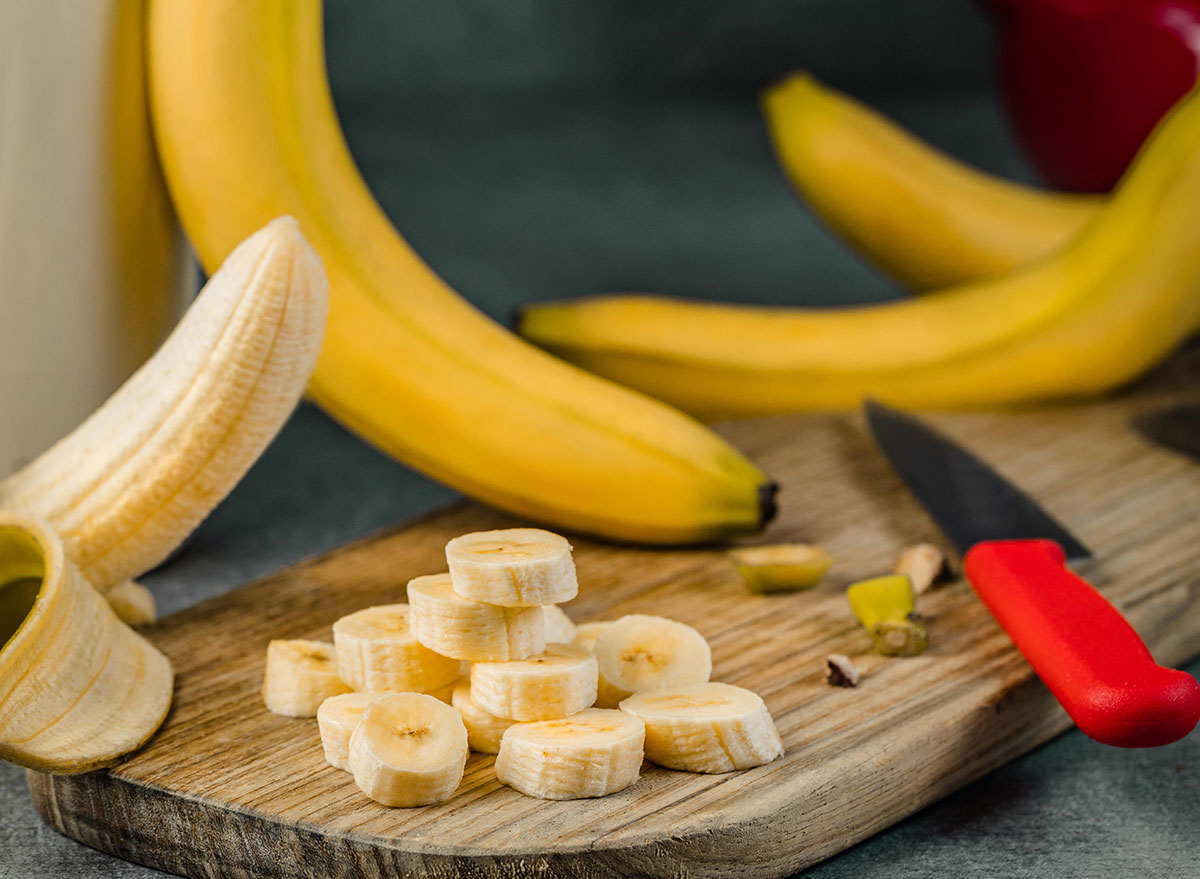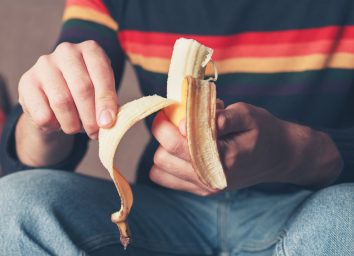The #1 Warning Sign You’re Eating Too Many Bananas
There’s no disputing that bananas are a nutritious food—not only are they an excellent source of potassium, magnesium, and B vitamins, but they’re also packed with filling fiber and cancer-fighting antioxidants. According to Harvard Health, the American Medical Association may have even named this fruit as the first “superfood” in the early 20th century. All that said, there is such a thing as eating too many bananas, and experts say it’s impossible to miss the top warning sign that you’re going overboard.
“The warning signs of eating too many bananas would be the same as eating too much of any food—uncomfortable fullness and digestive discomfort,” says Andres Ayesta, MS, RD, CEO of Planos Nutrition.
There are several reasons why you might experience some unpleasant GI side effects if you’re overdosing on bananas every day. According to researchers at Makerere University, this fruit contains a significant amount of tannic acid, which is harmless in small doses but can cause a number of side effects in large amounts. In the short term, ingesting a lot of tannic acid can cause constipation—and in the long term, it can negatively impact your microbiome (or gut health).
“Bananas can be constipating so if you are prone to that, track your symptoms,” says Lauren Harris-Pincus, MS, RDN, author of The Protein-Packed Breakfast Club. “Anyone watching blood sugar or with digestive issues needs to monitor their diets more carefully.
Related: Check out these 7 Healthiest Foods to Eat Right Now.
Another factor to consider is that bananas contain a natural sugar alcohol called sorbitol, which can trigger laxative-like effects in your body when you consume a lot of it. Bananas are also packed with soluble fiber, a specific type of carbohydrate that is known to cause gas. When your body starts breaking down both the sorbitol and the soluble fiber together, it produces carbon dioxide, methane gas, and hydrogen—which may result in flatulence, among other uncomfortable GI effects. Particularly among people who are already dealing with digestive issues, eating large amounts of the soluble fiber found in bananas can lead to bloating and constipation.
“Fruits contain the sugar fructose, which may trigger symptoms in people with IBS,” says Ayesta. “However, different people have different IBS triggers, so this is specific to the individual.”
Additionally, if you haven’t been eating a fiber-rich diet, and suddenly started eating a lot of bananas—it takes a lot of work for your large intestine to break down the soluble fiber, and when it gets overloaded, you may experience gas and/or bloating.
To be clear, eating bananas on a regular basis shouldn’t cause these side effects unless you already have a digestive disorder. Interestingly, bananas—especially less ripe ones—are high in resistant starch, which promotes gut health while also warding off constipation and gas. Still, experts say it’s best to eat them in moderation for several reasons.
“Eating too much of any single food is not a good idea because that means you are missing out on the variety of vitamins, minerals, antioxidants, and phytochemicals provided by eating an array of plant foods including fruits, veggies, nuts, beans, seeds, and whole grains,” says Harris-Pincus. “I wouldn’t recommend more than one banana a day for that reason. If you are eating so many bananas per day you are concerned, perhaps you should cut back.”
According to Ayesta, the main thing to ask yourself is whether the amount of bananas you’re consuming is causing you to exceed your calorie or carbohydrate needs—or miss out on nutrients from other food sources.
“90% of the calories in bananas come from carbs, and it’s important to have sources of protein and fat in your diet as well,” he explains. “Also, bananas consumed without including a source of protein and fat as well can cause blood sugar spikes that may make you feel lethargic.”
For the sake of balance, Harris-Pincus recommends pairing bananas with Greek yogurt and nuts or cottage cheese and chia seeds—that way, you’re getting a dose of healthy fat and protein as well.
The bottom line? As long as the amount of bananas you’re consuming allows you to meet your body’s needs, and doesn’t cause any noticeable digestive discomfort, then you should feel free to enjoy this superfood on the regular. So keep your portion sizes normal by whipping up one of these 10 Healthiest Banana Recipes.









